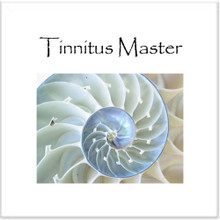 Loading... Please wait...
Loading... Please wait...Spin To Win
Categories
Add to Wish List
- Home
- Mind Sync Original
- Tinnitus Master (Mind Sync Original)
Product Description
What is Tinnitus?
Tinnitus is the name given to the condition of noises 'in the ears' and/or 'in the head' with no external source. Tinnitus noises are described variously as ringing, whistling, buzzing and humming.
The word tinnitus describes the sensation of hearing a noise in the absence of any external sound. This noise may be heard in one ear, both ears or in the middle of the head or it may be difficult to pinpoint its exact location. The noise may be low, medium or high-pitched. There may be a single noise or two or more components. The noise may be continuous or it may come and go.
What Causes Tinnitus?
Tinnitus is not a disease or an illness, it is a symptom generated within a person's own auditory pathways. Although it is often assumed that tinnitus occurs as a result of disease of the ears, this is often not the cause. The precise cause of tinnitus is still not fully understood.
Who Gets Tinnitus?
Experiences of tinnitus are very common in all age groups, especially following exposure to loud noise, however, it is unusual for it to be a major problem. There is a widely held misconception that tinnitus is confined to the elderly, but various studies have shown that it can occur at any age, even quite young children. Mild tinnitus is common - about 10 per cent of the population have it all the time and, in up to one per cent of adults, this may affect the quality of their life.
Audio Habituation
Certain types of tinnitus can be cured by audio habituation alone. It can certainly give temporary relief in most cases.
The use of full spectrum low impact noise has been scientifically proven to provide audio habituation for the tinnitus sufferer.
Our specially developed Tinnitus Master will reduce your symptoms quickly. Over time your tinnitus could be eliminated completely.
What is Habituation?
Our sensory systems are very adaptable. We can get used to sensations on the skin, such as the touch of a spider, that at first, bother us. We can get used to all kinds of smells that on first exposure seem intolerable. We can get used to taste sensations that initially are quite unpalatable.
When we move from a quiet country environment to live on a busy city street we are constantly aware of the traffic noises and believe that we will not be able to live with this constant level of noise. If someone would ask us in 12 months time whether we are bothered by the traffic noise, we would most likely reply that we no longer hear the traffic, unless we pay attention to it.
Some habituation occurs naturally. For example, the carotid artery, the main supply of blood to our brains, runs right next to the inner ear and yet we usually do not hear the pulse or heart sounds that are carried in the artery.









